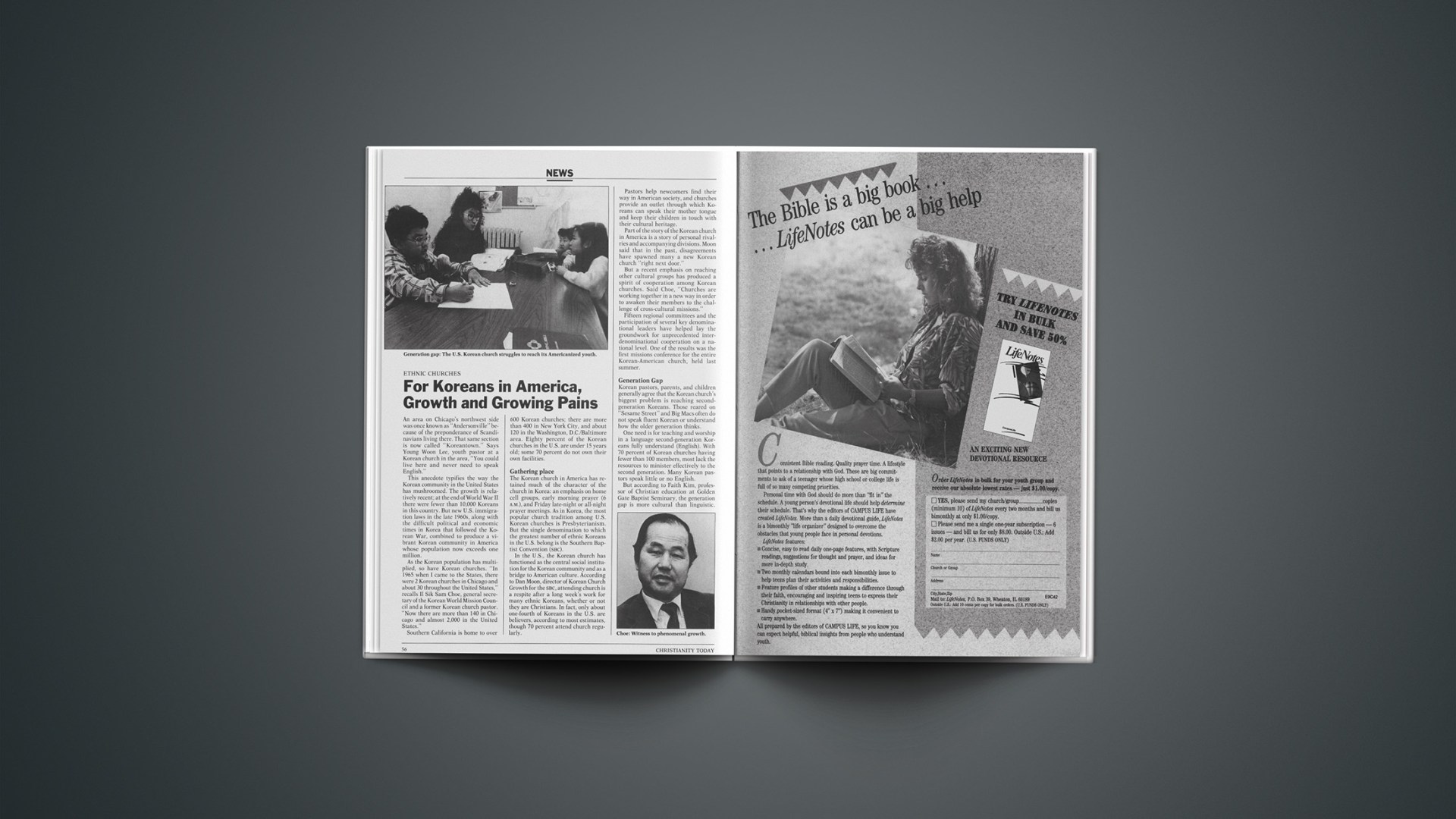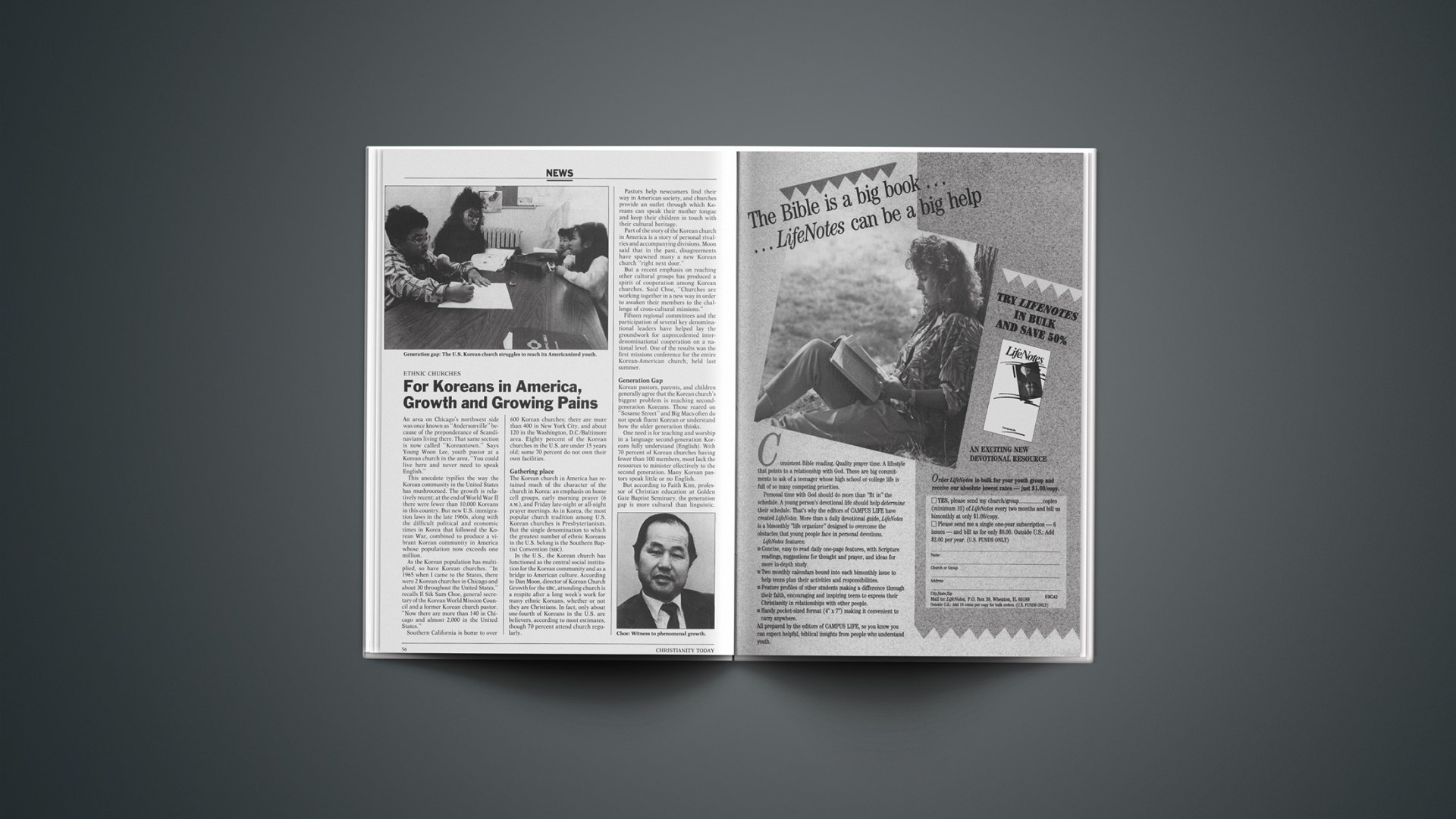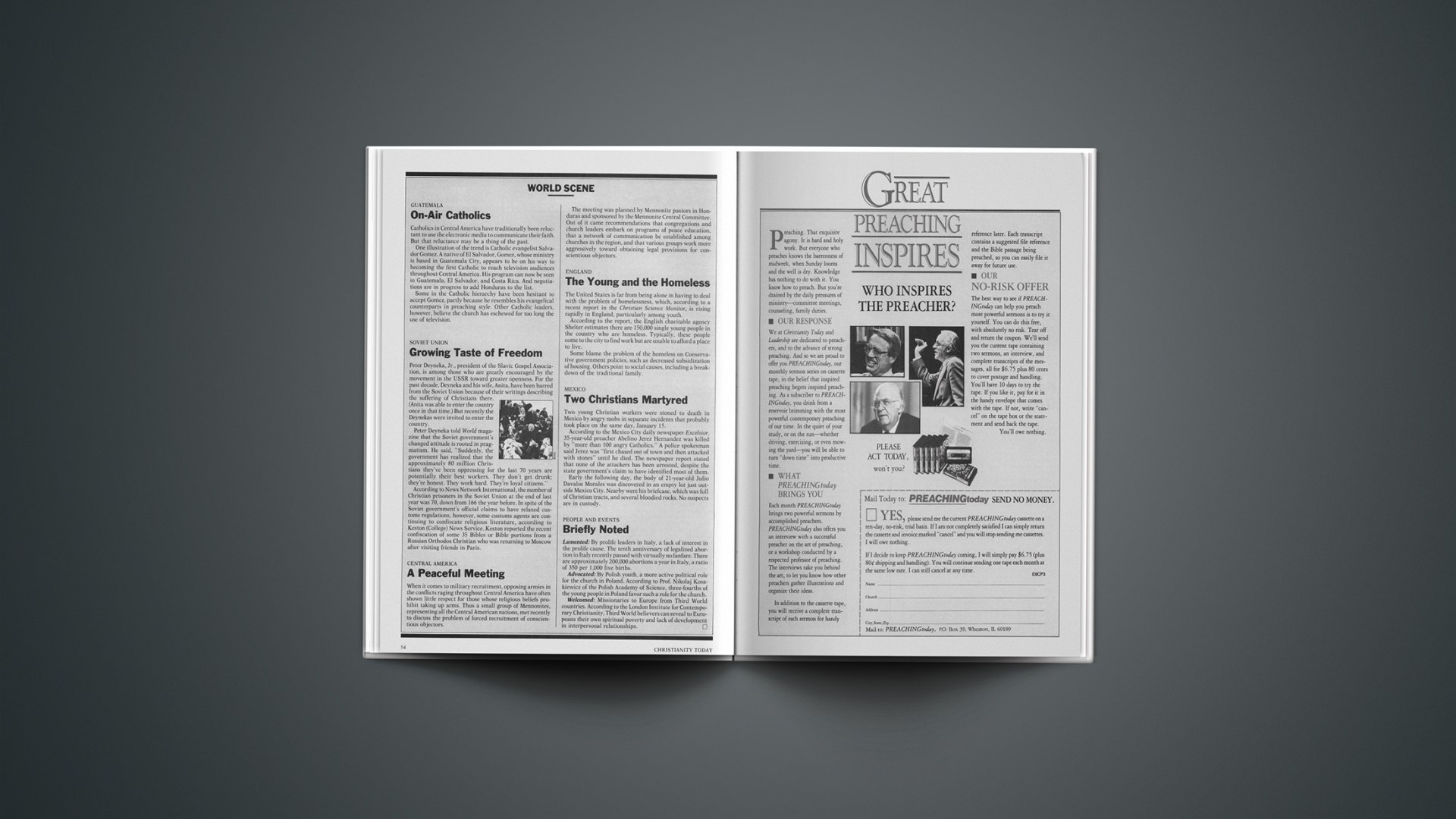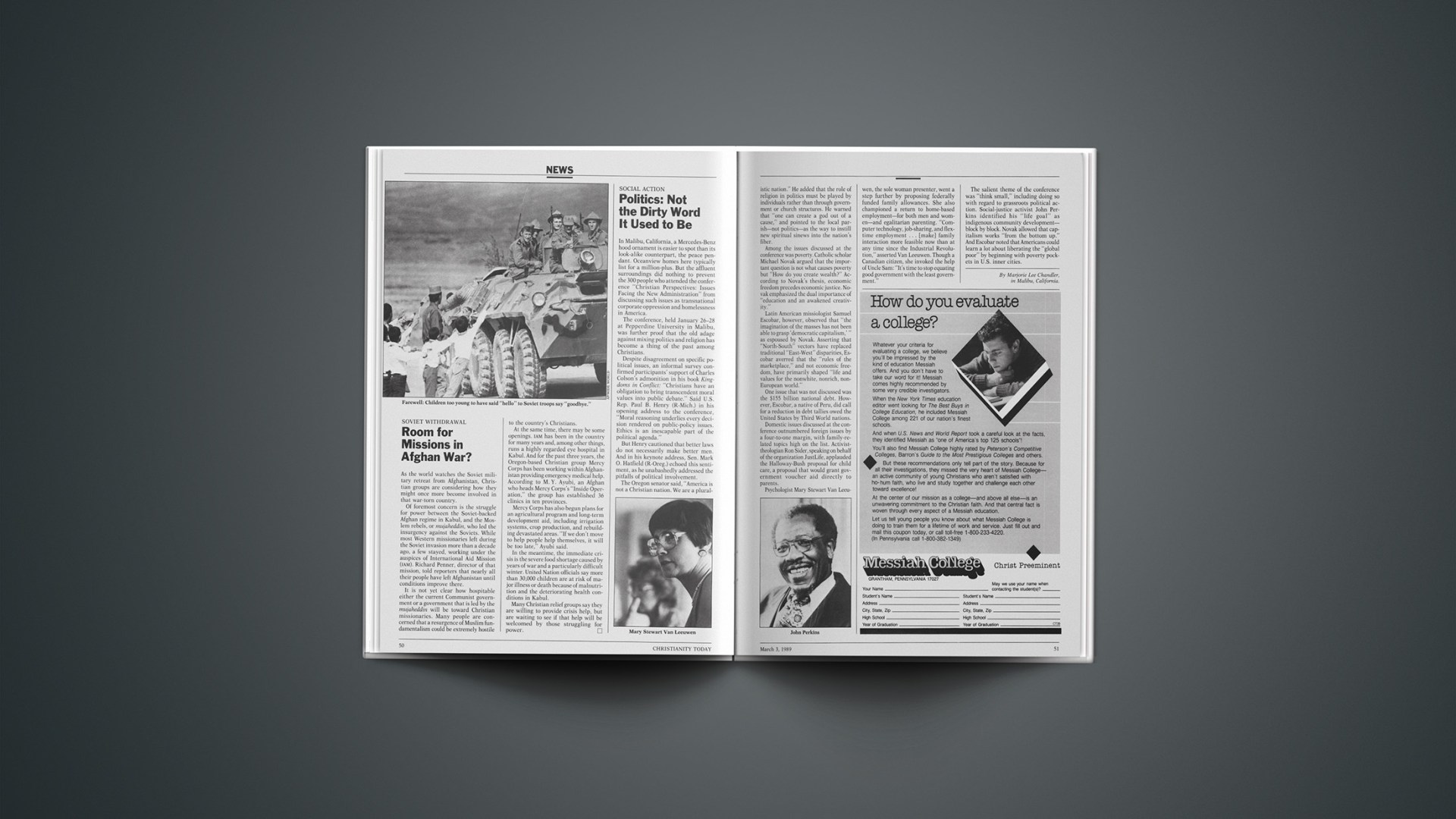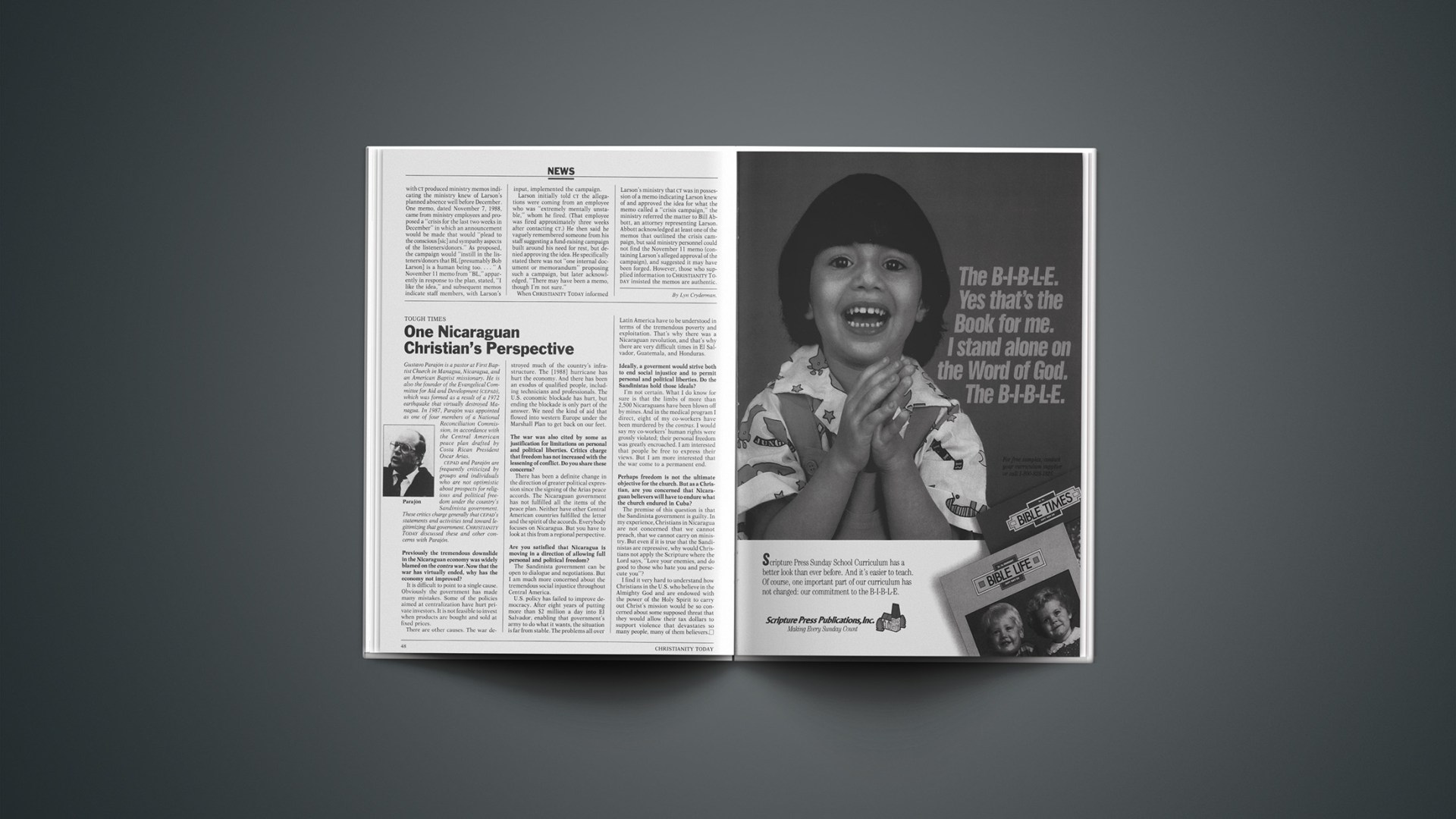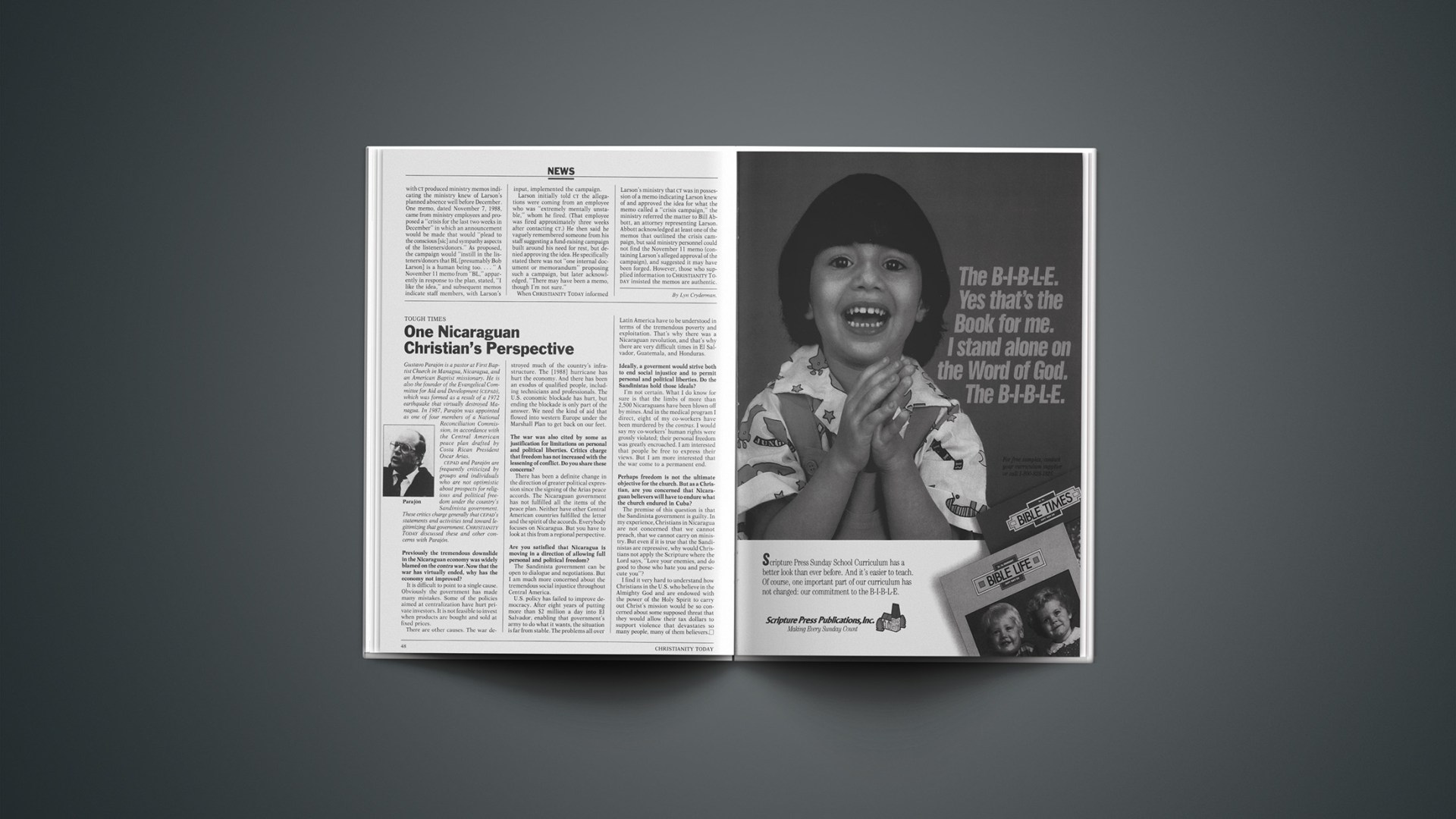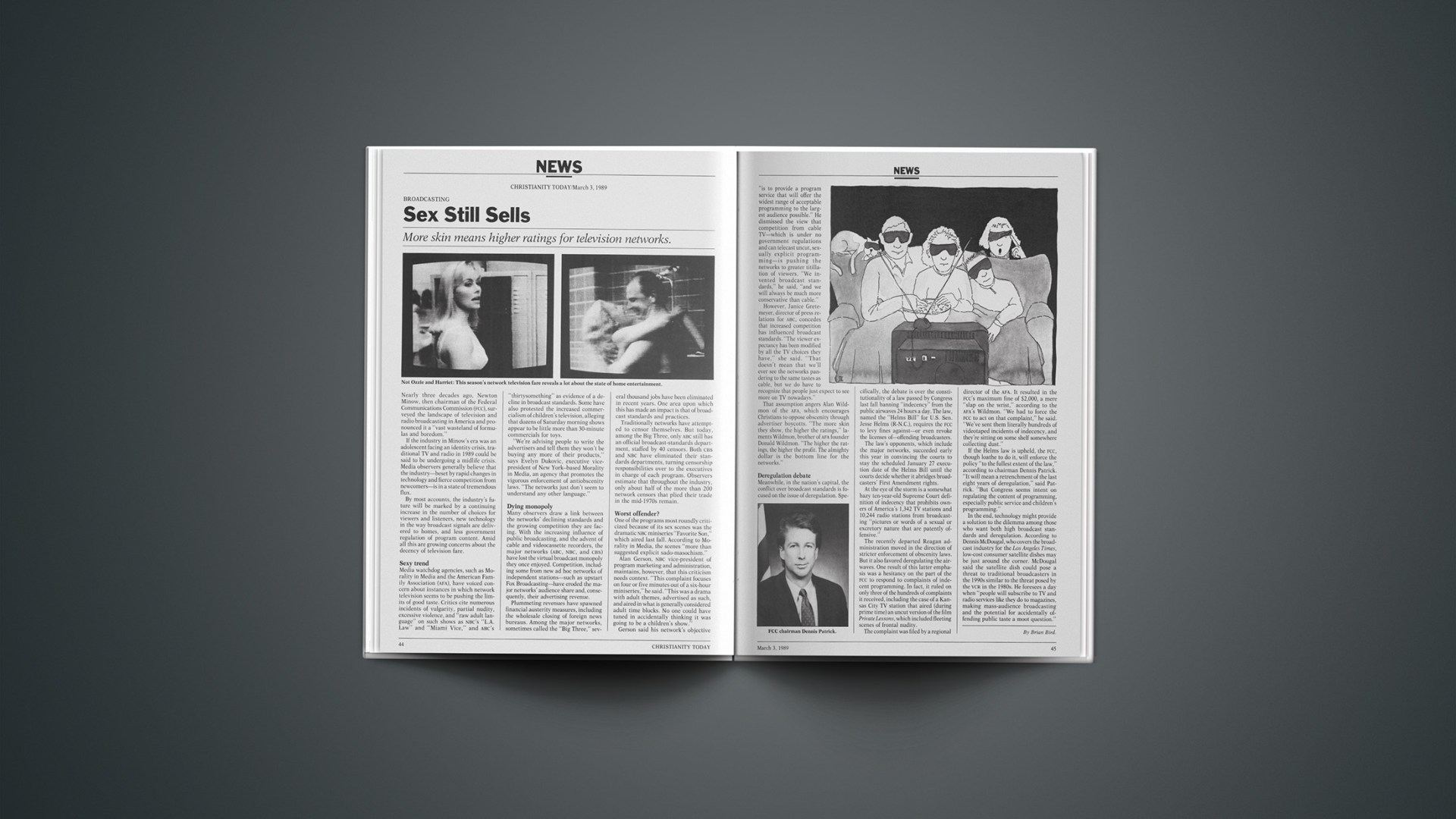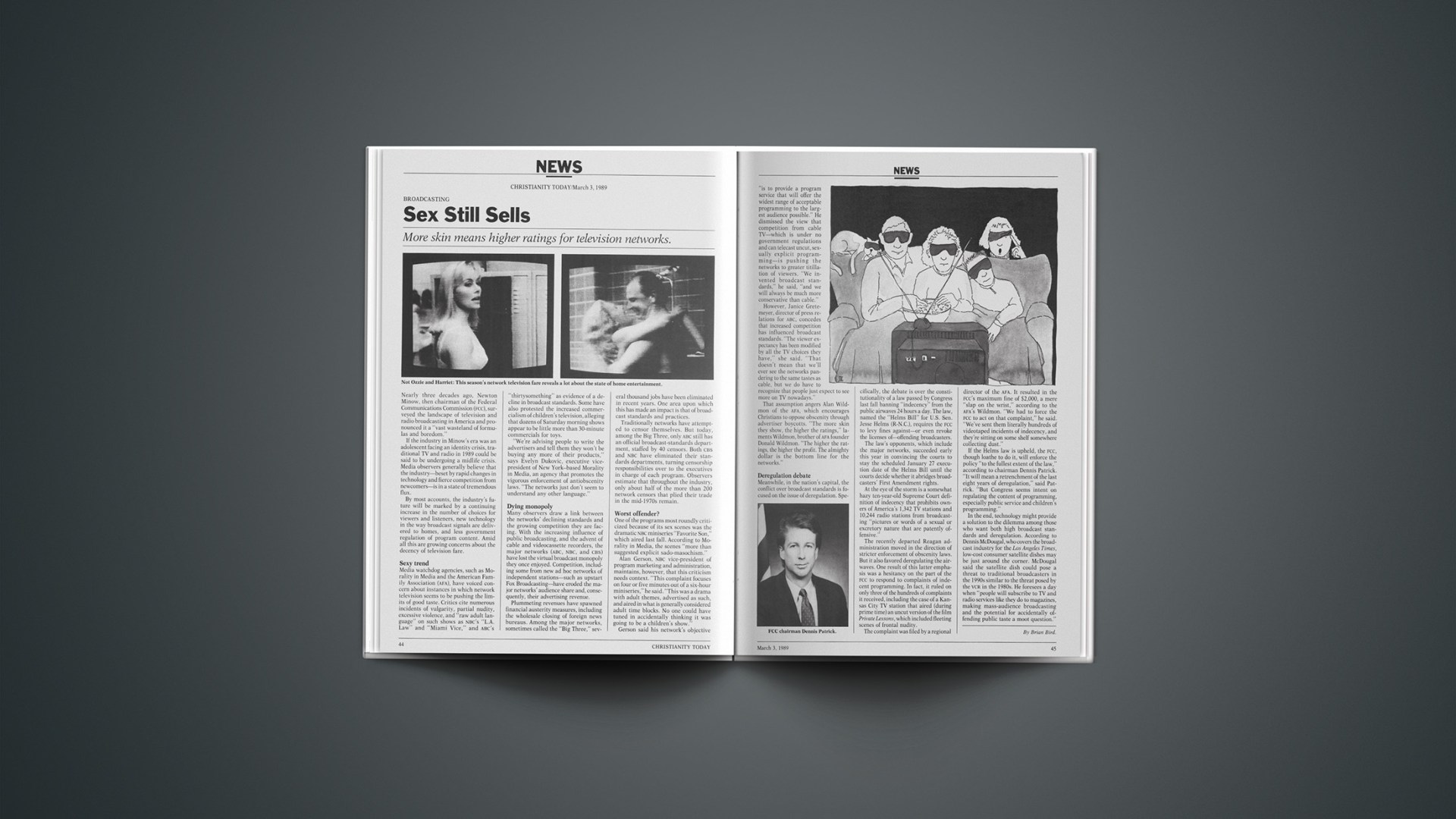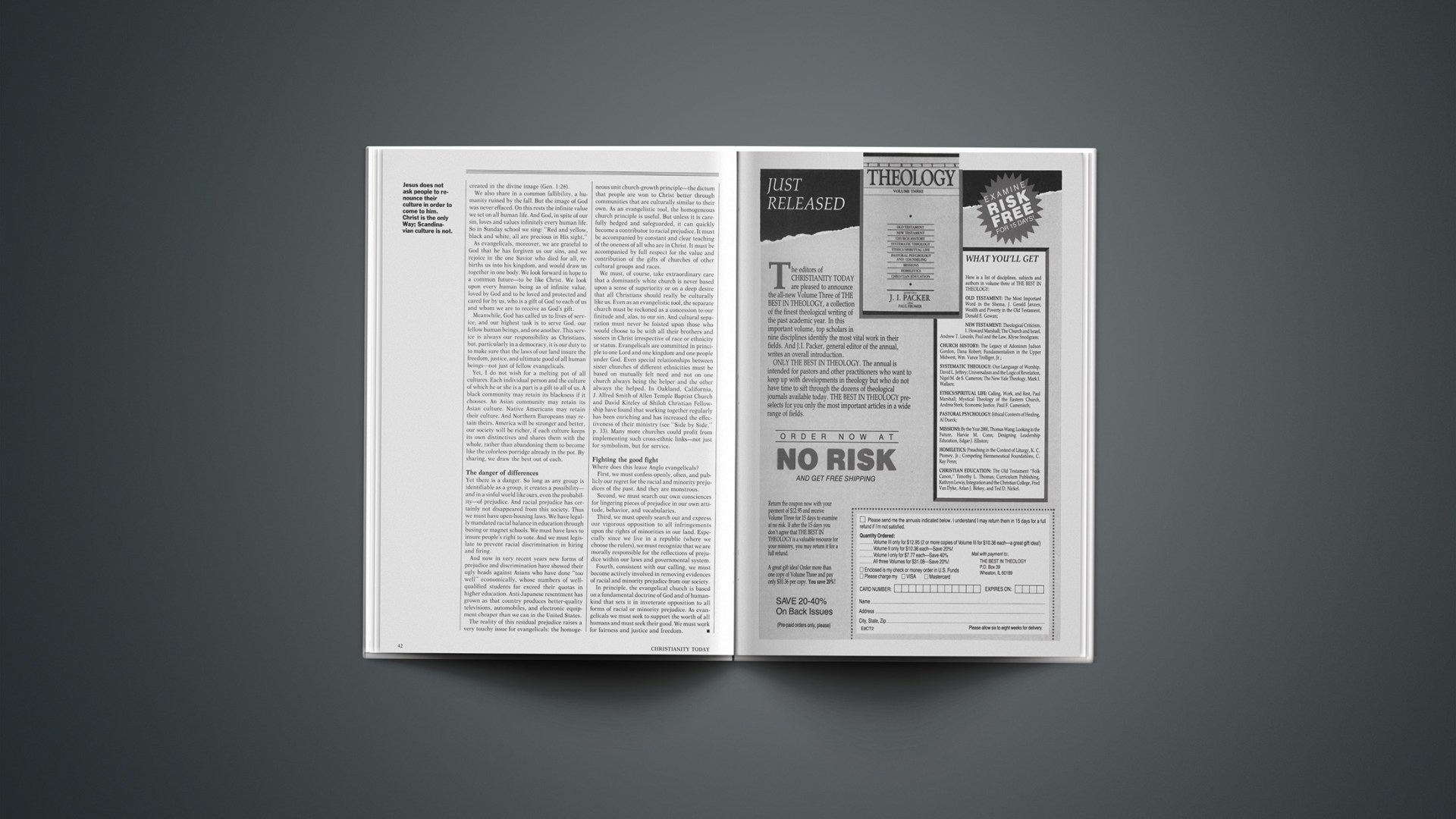A Different Gospel, by D. R. McConnell (Hendrickson, 190 pp.; $7.95, paper). Reviewed by William W. Menzies, professor of theology at Evangel College, Springfield, Missouri.
The fastest-growing segment of the modern Pentecostal/charismatic movement in America today is made up of independent, local “Faith” or “Word” churches. Distinct from the classic Pentecostal denominations and the charismatic fellowships within mainline denominations, these local churches, numbering in the thousands, have virtually all appeared within the past 20 years.
D. R. McConnell, of Oral Roberts University, believes that this vast, amorphous network of churches is at a crossroads, created by a crisis in theology. Within the next five years, the author contends, charismatic leadership must choose either to return to evangelical orthodoxy, repudiating the damaging errors of the “Faith Formula” movement, or be engulfed with a kind of teaching that can best be described as “cultic” (though McConnell makes clear he is not prepared to declare the Faith movement a cult in the classic sense of that term).
Faith Formula theology—attributed to a constellation of proponents such as Kenneth Hagin, Kenneth Copeland, Fred Price, Charles Capps, and Robert Tilton—is marked by the belief that a believer’s verbal assertion of a desired objective, affirmed in faith, requires God to bring that objective into being. Extreme forms of this teaching have led followers to believe that wealth and health are the badges of faith. At the heart of the theology is the assumption that God is required to behave in a particular way on command. For these followers, God becomes akin to a “cosmic bellhop,” rather than the Sovereign of the Universe. Faith teaching has become so pervasive, McConnell writes, that many noncharismatics believe it is the authentic representation of what the entire charismatic movement espouses.
Roots Of “Faith”
McConnell’s approach in A Different Gospel is to explore with care the historical influences that have shaped Faith teaching, a task no one else has adequately accomplished. And although he engages in careful historiography, McConnell announces in his preface that he is not content to stand in neutral detachment as a historian normally would. Rather, out of concern for the charismatic movement, he aims to expose the underlying errors that threaten its theological integrity.
McConnell believes that to imply the roots of the Faith teaching stem from the Pentecostal movement is inaccurate, and is a distinct disservice to Pentecostals. Here he chides Bruce Barron, in his Health and Wealth Gospel (IVP), for making this error. McConnell’s central thesis is that the roots of the Faith message come from other sources.
The author argues convincingly that Kenneth Hagin did not originate the teachings that bear his name, though he was the formative influence in shaping the Faith churches. Rather, as McConnell carefully documents, Hagin plagiarized extensively from others, most notably E. W. Kenyon. The first five chapters of A Different Gospel trace the historical influences that shaped Kenyon’s thought.
Kenyon, in fact, was strongly influenced by metaphysical cults, including Unity (New Thought), Unitarianism, and Christian Science. A common thread in this influence on Kenyon appears to be “mind over matter.” He introduced the concept of “Revelation Knowledge” as a fresh way of knowing truth, superior to what he calls “Sense Knowledge.” Some extreme Faith teachers advocate that esoteric experiences may furnish additional truth to supplement scriptural revelation, thereby implying that such contemporary “revelations” have apparent equal validity to the Scriptures. McConnell employs an entire chapter to expose the cultic elements in this notion, which he refers to as a “new gnosticism.”
What Kenyon produced, the author avers, is in fact a syncretism of New Thought metaphysics (mind over matter) and radical fundamentalism—a “different gospel.” While this new teaching has engendered considerable controversy within the charismatic world, efforts to date to effect reconciliation have been superficial. McConnell expresses concern that unity has been sought at the expense of serious consideration of biblical truth.
Aberrations From Orthodoxy
The second part of the book is a biblical analysis of what the author perceives to be the significant aberrations from orthodox evangelical theology to be found in the teachings of Kenyon and Hagin. These aberrations include the notion of a direct way of knowing truth that on occasion appears to contradict the teachings of the Bible; confusion about “identification with Christ” that implies the potential of deity for mankind; formula faith for manipulating God for healing; and the idea that in the present age true faith is the key to material prosperity.
In his conclusion, McConnell warns classical Pentecostals and evangelicals of their vulnerability to the infiltration of Faith teaching. Indeed, he reports, it has already begun. “This contagion cannot be allowed to continue. The Faith theology must be identified and shunned for what it is: a different gospel.”
The chief contribution of A Different Gospel lies in the careful documentation of the sources of Hagin’s theology. McConnell makes a persuasive case for the cubic influences in the theology of Kenyon, and for the overwhelming influence of Kenyon’s ideas on the teaching of Kenneth Hagin. Although the theological analysis provided in the second part of the book is useful, others have engaged in a similar endeavor. But McConnell is to be commended for courageous pursuit of the truth and for his substantial documentation of facts. Pentecostals, charismatics, and other evangelicals should welcome such a timely and thoughtful challenge to a growing and questionable influence.
On the Tail of a Comet: The Life of Frank Buchman, by Garth Lean (Helmers & Howard, 569 pp.; $12.95, paper). Reviewed by Donald G. Bloesch, professor of theology, Dubuque (Iowa) Theological Seminary.
When people change, nations change—that was the claim of Lutheran pastor Frank Buchman. His vision became tangible reality in the early 1930s in the Oxford Group, which later became Moral Re-Armament. Buchman’s emphasis on applying personal religion to the political situation affected the moral and spiritual condition of people from Europe to China to America’s segregated South in the first half of this century. Through houseparties, plays, films, and personal contacts, MRA spread its message of political and social reform through personal spirituality; more particularly, through the practice of absolute purity, unselfishness, honesty, and love.
Quite simply, Buchman set out to remake the world (and if he fell short of his goal, his impact was nonetheless considerable). On the Tail of a Comet, Buchman’s biography by British journalist Garth Lean, provides a fascinating account of the life and thought of this innovative, controversial American evangelist.
From its inception prior to World War I, the renewal movement sparked by Buchman touched the lives of leading figures in religion, industry, the social sciences, education, and government, including such notables as Paul Tournier, the Swiss psychiatrist; Konrad Adenauer, chancellor of West Germany; Prime Minister U Nu of Burma; and theologian Carl F. H. Henry.
Buchman drew his philosophy from a number of spiritual writers, including Robert Speer, Henry Drummond, Henry Wright, and Thomas a Kempis. Like Speer and Wright, he upheld the ideals of absolute honesty, purity, unselfishness, and love as the apex of Christian living. He believed these ideals could become practical realities in daily life, though only through constant surrender to the power of the Spirit.
Although he was frequently criticized for teaching perfectionism and moralism, Buchman saw that the righteous life could be attained only through the experience of the glory of the Cross, and that one must continually confess need for the sanctifying work of the Spirit.
Reaching The Nazi Elite
The spiritual revolution launched by Buchman was surrounded by controversy from the very beginning. The movement was accused (Lean says unjustly) of encouraging people in group settings to give lurid confessions of sin in order to attract publicity. It was upbraided for what many considered to be its naive approach to complex social questions—the notion that group conflict in society can be fully resolved through personal change.
When the Oxford Group became Moral Re-Armament, it was suspected of downplaying the uniqueness of Christ in order to gain a hearing in other religious traditions. It should be noted, however, that personal conversion to the living Christ was never eclipsed in Moral Re-Armament, though it may have become somewhat muted.
In the thirties, Buchman was convinced that the renovation of Germany and the peace of Europe lay in the conversion of the Nazi elite, who would then revoke the war policy of their nation. To this end, Buchman sought to reach Nazi official Heinrich Himmler and the “German Christian” Bishop Hossenfelder; but his efforts proved fruitless. Buchman’s actions in this area were consistent with his conviction that people can never sink so low that they cannot be reclaimed by God’s grace.
For a time, Buchman saw National Socialism as a possible bulwark against communism, but he later confessed that he had been deceived. He finally recognized the movement as a demonic trend that prospered because of the deleterious spiritual vacuum in Germany. Even at its inception he was persuaded that National Socialism was alien to the truth of the gospel.
After the war, Moral Re-Armament helped bring about at least a partial reconciliation between France and Germany, as leaders of both nations have acknowledged. In the American South, the group was responsible for changing the hearts of some avowed segregationist leaders, who then threw their support behind the drive for racial integration and equality.
No Substitute For God
Buchman never claimed to be a systematic theologian. He is best understood as a twentieth-century saint whose life of simplicity and single-minded devotion to his Lord constitute an irrevocable sign of the coming kingdom of God. One of his companions remarked that “Buchman fought strongly, with a fierceness that seemed unreasonable, against the weakness in those who tried to put their trust in him as a man.” He was fully aware that “to love the idea of Moral Re-Armament is no substitute for the love of God who washes us, sets us free, and sets us to work.” He gave away nearly all the money he received from his supporters and was humble and self-effacing throughout his life.
Buchmanism can be criticized for downplaying doctrine and unduly emphasizing personal experience and the remolding of character—an imbalance that is conspicuous in Moral Re-Armament today. Yet Buchman, with his emphasis on personal transformation as the key to social reformation, stands in a long evangelical tradition. Henry Van Dusen of Union Theological Seminary has described Buchman’s work as “perhaps the most powerful, and certainly the most striking, spiritual phenomenon of our times.”
This eminently readable book, through its more than 500 pages, is in the end simply the remarkable story of how an unassuming but wholly consecrated American pastor helped renew the hope that at least some of the promises of the kingdom would be realized on Earth as well as in heaven.

